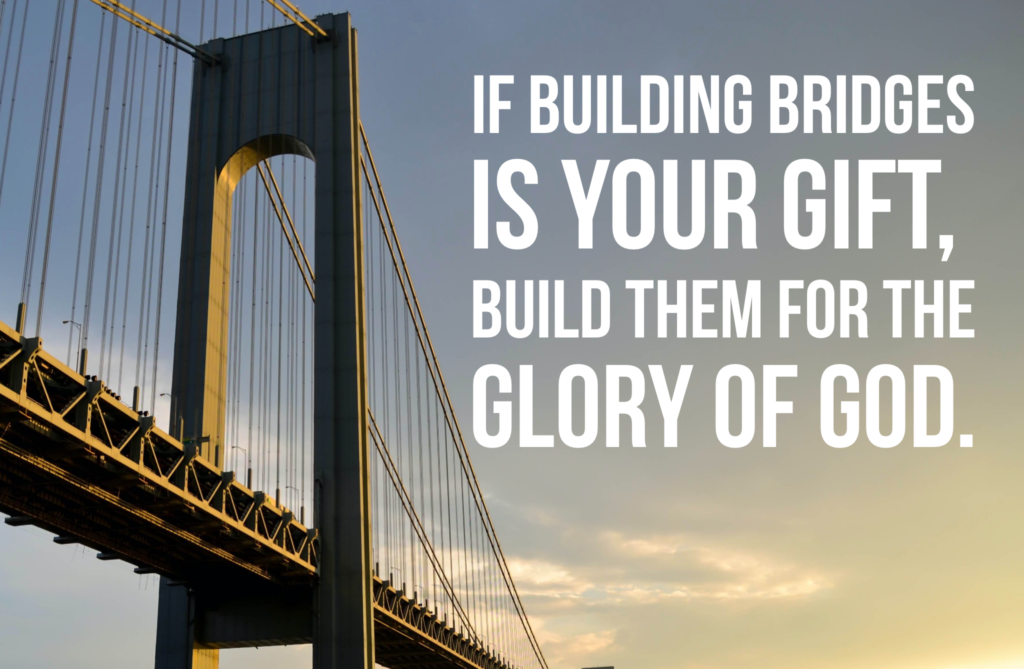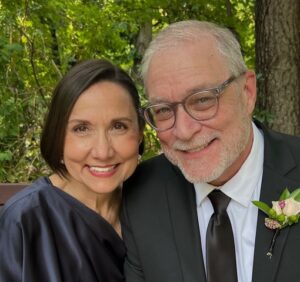You were wondrously created by God, embrace the gifts God has given you and don’t diminish those gifts because you see something else as more desirable or important. Throughout my life I’ve wrestled with visibility, importance, and validating the absolutely unique calling with which God has called me. Embracing my “wiring” as a spiritual engineer is key to my contentment. My greatest joy is creating tools and structures that serve the Body of Christ. I recognize it as the gift of a prophet, to hear and see the heartbeat of God and to know how to accomplish it.

I get joy from building “bridges” and watching people use the bridge to get from one side to the other. Entire economies are changed by bridges. Where people live, where they worship, where they do business, all of this is shaped by bridges. Small businesses sometimes exist because a bridge expands their base enough to make a go of it.
Causing transformation is about building bridges to bridge the gap between where a person is and where they are called to go. Leading, coaching, mentoring, teaching, preaching, training, and resourcing out of a prophetic unction is about designing and building bridges.
When I build a bridge (a divine functional structure) it brings great satisfaction and fulfillment to take a step back and love that it is finished, that it is beautiful in its own way, that it is being used, that it is being used without people even thinking about where it came from or the skill that went into its design and construction.
The beauty of bridge building is I don’t have to man the toll booth because that is the role of the one with the gift of pastor. I don’t have to paint it when it needs a face lift, I don’t have to direct traffic on the bridge, I don’t have to sandblast it when it starts to rust. I build the bridge and then I take a step back and admire the work and its functionality and then I move on to the next gap that must be bridged.
What will Donna and I leave behind in Africa? Bridges, I hope. What will we leave behind in Africa? Functions, processes, bridges, paths. What will we leave behind in Africa? People trained, mentored, and lifted as transformational servant leaders, equipped to lift, in turn, those they lead.
We all have a root of pride that needs crucifixion. I have struggled my entire life feeling the need to be the apostle. I was constantly exposed to the idea that if I were to accomplish something of enduring worth I would need to be an individualistic swashbuckling leader who single-handedly cleared the path and built the mechanisms. If I wanted my work to be recognized I needed to be THE leader. When you build bridges, no one thinks about who built the bridge. The name of the designer or builder is rarely on the bridge. Who’s name is on the bridge?: The politician who procured the funding for the bridge. The bridge would not be there without the funding of the politician, the structure would not be there without an apostle or a superintendent clearing the way for it and supporting it. No one really remembers who built bridges, all they might remember is who championed the building of the bridge.
We can take solace in the fact that one breaks up fallow ground, another plants, another waters, but God gives the increase. We can take solace in the fact that the Body of Christ is made up of many members, each doing their part. Reality is, some apostles clear the way for the vision and may tend to not validate the work of other members of the Body of Christ who make the vision happen, and then we wonder why everyone wants to be an apostle. That is so wrong. (Which I must add for clarity that my Pastor, Don Gifford, was never this way and I enjoyed working with him for 13+ years.)
A politician says, “look at the bridge I built,” when they did not design it, they did not build it, and they did not pay for one cent out of their own pockets. They championed the cause, they pulled support from their colleagues, and they led a vote to fund it. See, this is what I’ve struggled with my entire life. I’ve collaborated on bridges that leaders have championed. Its not that I could not envision a bridge in a particular place or have the foresight to see how the eco-system could be helped by its placement; it is that my calling is prophetically seeing and building bridges. At the ribbon cutting the politician is front and center and the architect, the engineer, and the builder are in the wings looking on. I could take this even one level further to those who drove the rivets and raised the steel. They too point to the bridge and tell their grandchildren, “I built that bridge.”
Who built the bridge? They all built the bridge. God orchestrated a chorus to build the bridge. When we worry about who gets the credit or when we fail to acknowledge every contribution as essential to the building of the bridge we damage the hearts of those who gave of themselves for its completion.
Apostles, prophets, evangelists, pastors and teachers, they all built the bridge. I’ve heard Carolyn Tennant refer to the interaction between the five ministry gifts to the church as “a dance,” each deferring to the other as they mirror the collaboration of the Trinity. We aren’t very good at that dance, and as a result we devalue the necessary and critical contributions of every member of the Body of Christ.
If only we could be a people with our pride crucified, walking in humility, preferring and seeking to honor one another, the Body of Christ would be healthier. We would accomplish more. We would have people embracing in and anchoring in their spiritual gifts.
During the second Great War, Winston Churchill visited the coal mines. Churchill knew the critical importance of coal to the war effort. He also knew that cutting coal was not glamorous. In a speech to the miners, Churchill encouraged them with these words.
“We shall not fail, and then some day, when your children ask: What did you do to win this inheritance for us and to make our name so respected among men?” one will say: “I was a Fighter Pilot,” another will say: “I was in the Submarine Service,” another: “I marched with the Eighth Army,” a fourth will say: “None of you could have lived without the convoys and the Merchant Seamen,” and you, in your turn will say, with equal pride and with equal right: “WE CUT THE COAL.”
On that day, when I stand before Father, and he asks me what obedience I gave, I will say, “I built bridges, I built bridges that helped others fulfill what you asked of them. I built bridges that helped people overcome the obstacles to the fulfillment of their calling. I did what you asked of me, I built the bridges.”

